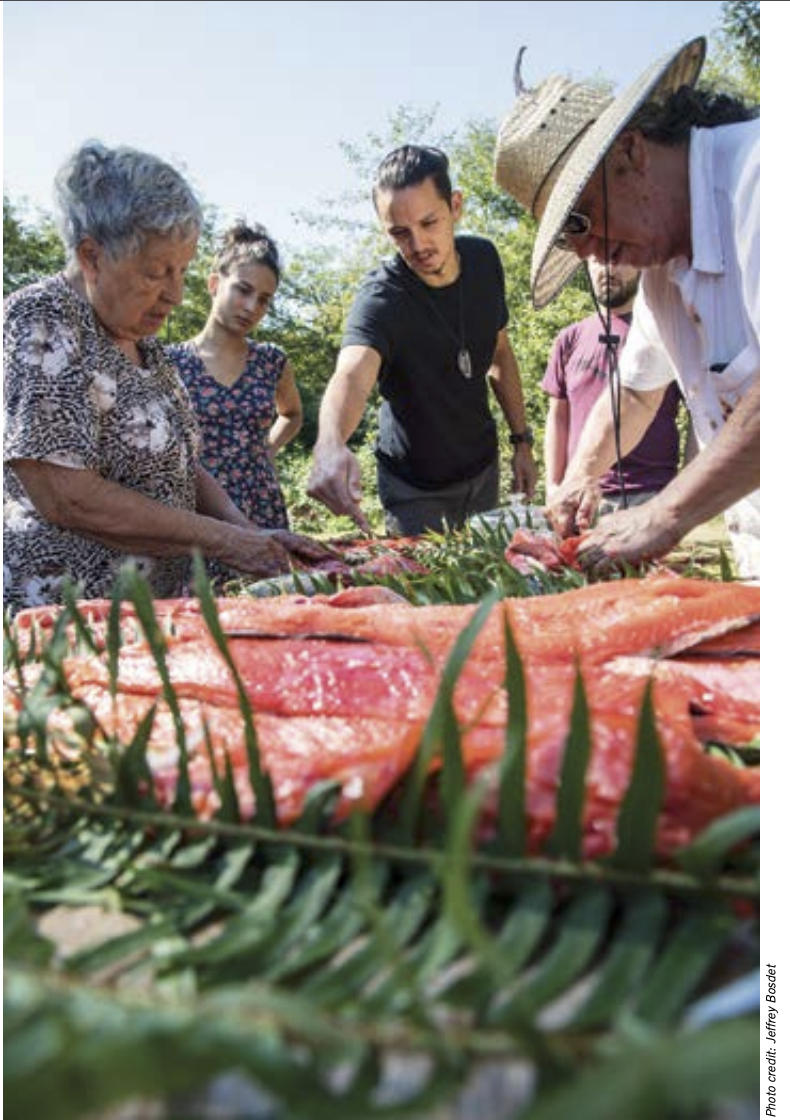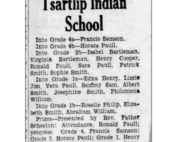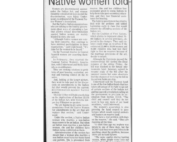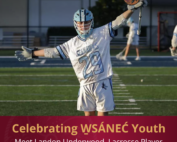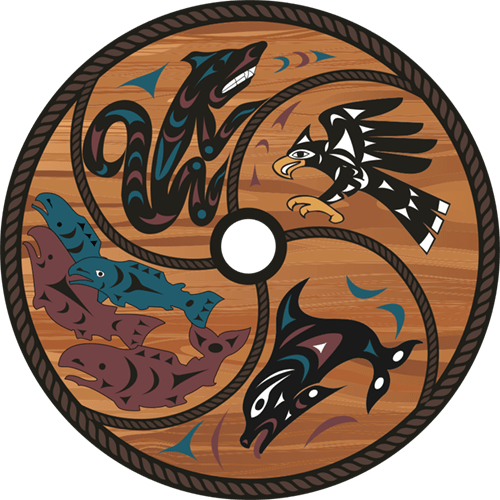Community Profile: Tsawout’s YELḰÁTŦE (Rob Clifford), Ph.D. Law Student
YELḰÁTŦE* (Rob Clifford) wasn’t really sure about his life path at first. He was late to sign up for classes at University and ended up taking Anthropology. Somewhat to his surprise, he performed really well. When a professor at the University of Victoria suggested he major in Anthropology, he did.
While attending UVic to complete his undergrad, it became clear: Clifford’s interests lay in law, specifically Indigenous Law, known to the W̱SÁNEĆ as Natural Law.
Clifford then went on to obtain both of his law degrees—his Juris Doctor (J.D.) and his Master of Laws (LL.M).—at UVic’s Faculty of Law, because of its focus on Indigenous legal traditions.
“When I went into law school it was always with an interest in Aboriginal law and Aboriginal rights and the different ways that I could assist my community and First Nations communities in general. UVic was the only school that I applied to – it was my overwhelming interest,” Clifford says in an interview for UVic.
It was while attending UVic that he met John Borrows, or Kegedonce in Anishinaabe. Borrows is Anishinaabe/Ojibway, and is a member of the Chippewas of the Nawash First Nation in Ontario. Borrows is a leading authority on Canadian Indigenous law and constitutional law, and he has been cited multiple times by the Supreme Court of Canada. Borrows would go on to become an instrumental influence in Clifford’s career and life, encouraging his study of both Canadian law and Indigenous law.
While “summering” for his second year at the acclaimed Aboriginal Law firm, Devlin Gailus Watson Barristers & Solicitors, Clifford was called to the bar, and, at the same time, he was accepted back to UVic to pursue his Master’s degree.
Faced with the choice to continue practicing Canadian Law or diving more deeply into Indigenous law, Clifford decided to pursue his Masters degree. John Borrows encouraged him to think about Indigenous peoples’ systems of law and how Clifford could contribute to strengthening them.
During his Master’s thesis, Clifford completed an in-depth look at the 2011 Oil Spill at SELE₭TEȽ. (known as Goldstream) through the lens of W̱SÁNEĆ Natural Law**. His thesis is a significant contribution to the potential application of Coast Salish traditions and knowledge to legal practices in the coastal regions of BC, particularly in the remediation of oil spills.
Since completing his Master’s degree, Clifford has gone on to pursue his Ph.D, spending a year in Toronto to fulfil his onsite class requirements.
When asked how his academic success has impacted him personally, Clifford is clear:
“I want my work to be something that is grounded in and useful to the community”
Carrying the SENĆOŦEN name of his late-grandfather (Earl Claxton Sr.), Clifford now lives with his wife and three-year-old on Vancouver Island in the house his great-grandfather built: “It was important for me to fix it up.”
“For me, it’s been hugely transformative because it has never been academic, it’s deeply personal. There’s a strengthening power and inspiration in carrying my grandfather’s name and picking up his teachings. I can’t speak about any of those laws and teachings unless I make them a part of me. Since I started carrying the name of my grandfather, it’s structured how I do things. My grandfather spent a great deal of his life strengthening our language. He clearly cared so much about the community. There’s power in the language. I am continuing his work in my own way, using our creation stories as a lens.”
And, continuing the work he certainly is, both in and out of academia.
While working on his Ph.D. and raising a toddler, Clifford works on the W̱SÁNEĆ Technical Advisory Committee for the WLC and teaches at UBC, where he hopes to continue the W̱SÁNEĆ Law Field School he started at UVic.”
The Outdoor School started as a pilot project at UVic in 2018 as part of a joint degree program that grants students two professional degrees, one that allows them to practise Canadian common law and the other that allows them to engage with Indigenous legal traditions. The joint degree is the first of its kind in the world, and has students of the 4-year degree program participate in mandatory field studies in Indigenous communities across Canada, the first of which was the LÁU,WELNEW Tribal School on the Tsartlip First Nation reserve. Graduates of the program earn professional degrees in both Canadian Common Law (Juris Doctor or JD) and Indigenous Legal Orders (Juris Indigenarum Doctor or JID).
“The UVic students that participated in the W̱SÁNEĆ Law Field School said it was a truly transformative experience and their favourite part of the school year. These are some of the future teachers, judges, lawyers, and politicians. If they can experience a meaningful engagement with the community, our laws and teachings, it will hopefully help lead to more productive relationships.”
Clifford continues, “We hear the word reconciliation a lot, but it’s not accompanied by much meaningful action. Reconciliation or remedy can’t begin without understanding the harm done, which isn’t really possible until you engage with the community, culture and our community process.”
In his Master’s thesis on the spill at Goldstream, Clifford outlined the deep and meaningful differences between Canadian Law and Natural Law.
“You can’t cram Indigenous Law into Canadian Law. I’m more interested in exploring Natural Law on it’s own, not necessarily in comparison with Canadian Law.
A system of laws isn’t a set of rules as much as it is a way of being, or creating particular citizens. It asks: ‘what does it mean to be a responsible person in the community?
What does it mean to live in a healthy way?’
For instance, the notion of sovereignty, a common concept underpinning Canadian law is a largely European construct, and in many ways is in direct contrast with what the Coast Salish believe.
Sovereignty tends to be actualized as a supreme authority over nature, for instance. Where for us, we have a responsibility to care for the Islands because they aren’t separate from us. In our creation story, they are our ancestors or ‘Relatives of the Deep’.
With the impacts of climate change becoming more serious each year, we can’t continue as we are. Changes need to be made. My work shapes the way I carry myself and my interactions with both human and non-human. Of course, I am not perfect, but it’s what orients me and is the foundation of my work.”
In his regular work on the W̱SÁNEĆ Technical Advisory Committee, Clifford is well positioned to make changes. He sits with other W̱SÁNEĆ community members on a team tasked with absorbing the huge volume of information provided by third parties–much of which is from the colonial government--and responding in a way that respects W̱SÁNEĆ traditions.
“It’s a lot of information, that has big implications,” Clifford explains. “In the technical committee, we think critically about challenges and benefits, we provide recommendations, guidance and a set of concrete points for the council to consider going forward.”
The WLC is lucky to have such an accomplished member of the community lending his expertise to its mandate of promoting the interests of the W̱SÁNEĆ First Nations.
On track to complete his dissertation this summer, Clifford is poised to earn his Ph.D. shortly thereafter. As the first person of the WSÁNEĆ Nation to become a lawyer, spearheading the outdoor program, published in McGill Law Journal, and even receiving praise for taking part in the rescue of a drowning man off Island View Beach, Clifford has every reason to be proud. Instead, he keeps moving and is humbly dedicated to serving his community.
* SENĆOŦEN pronunciation guide here: http://saanich.montler.net/say/index.htm
** A shorter version of YELḰÁTŦE’s Master’s thesis was published in the McGill Law Journal.
RECENT POSTS
How are we doing?
“For me, it’s been hugely transformative because it has never been academic, it’s deeply personal. There’s a strengthening power and inspiration in carrying my grandfather’s name and picking up his teachings. I can’t speak about any of those laws and teachings unless I make them a part of me. Since I started carrying the name of my grandfather, it’s structured how I do things. My grandfather spent a great deal of his life strengthening our language. He clearly cared so much about the community. There’s power in the language. I am continuing his work in my own way, using our creation stories as a lens.”


